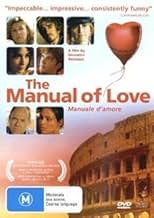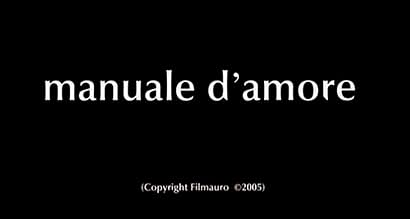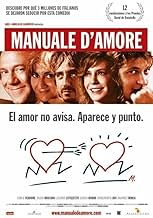IMDb-BEWERTUNG
6,3/10
5292
IHRE BEWERTUNG
Hinreisend, bezaubernd und einfach wunderbar - eine Liebeskomödie, die das Leben schreibt! Ein Film, genussvoll und belebend wie ein Espresso am Morgen!Hinreisend, bezaubernd und einfach wunderbar - eine Liebeskomödie, die das Leben schreibt! Ein Film, genussvoll und belebend wie ein Espresso am Morgen!Hinreisend, bezaubernd und einfach wunderbar - eine Liebeskomödie, die das Leben schreibt! Ein Film, genussvoll und belebend wie ein Espresso am Morgen!
- Regie
- Drehbuch
- Hauptbesetzung
- Auszeichnungen
- 10 Gewinne & 21 Nominierungen insgesamt
Empfohlene Bewertungen
10diane-34
Another one of those surprising little masterpieces that one sees accidentally; a movie that you know little about but once seen leaves you with warmth and satisfaction having been taken on a journey we all know.
Diane and I loved the film and left the theater with smiles on our faces and happy satisfaction animating our post-movie conversation. Maybe this pleasantness was a result of the writer's/director's choice of vignettes that ended the movie-it was the happiest, most satisfying of the four stories that composed the film.
The script was subtly formed so that the stories have a soft connection between them and the final story felt the most satisfying to me. These four faces of love are examined softly-no major drama here-just a quiet look at the most obvious faces that present to us of this feeling called love.
It is easy to see why this film won 11 Italian Oscars because the acting is acting at the point where the viewer is unaware that the people are acting the story. These theme variations are so well crafted that the viewer is left feeling that he/she is an emotional voyeur in that they are present during these stages of love.
Do make an effort to see the film-it is worth your time and effort to do so.
Diane and I loved the film and left the theater with smiles on our faces and happy satisfaction animating our post-movie conversation. Maybe this pleasantness was a result of the writer's/director's choice of vignettes that ended the movie-it was the happiest, most satisfying of the four stories that composed the film.
The script was subtly formed so that the stories have a soft connection between them and the final story felt the most satisfying to me. These four faces of love are examined softly-no major drama here-just a quiet look at the most obvious faces that present to us of this feeling called love.
It is easy to see why this film won 11 Italian Oscars because the acting is acting at the point where the viewer is unaware that the people are acting the story. These theme variations are so well crafted that the viewer is left feeling that he/she is an emotional voyeur in that they are present during these stages of love.
Do make an effort to see the film-it is worth your time and effort to do so.
A flaw that I feared before watching this movie was stereotypes about love, like men playing tricks on women to conquer them or betrayals with best friends. As a matter of fact the movie is divided into various parts, each one describing a stage of love: falling in love, crisis, betrayal and abandon. The different mini-stories are tied with each other by characters who are somehow related and the end of the movie connects with the beginning as an ideal circle. Despite the same old stories about relationships and developments of love stories, this movie has anyway some good aspects. For example, each actor plays his own repertoire, displaying their qualities in what they do best and for what they're known for. The best sketches, in my opinion,are made by Goffredo, played by Carlo Verdone, and Marco, played by Sergio Rubini, who offer the sense of humor shown in their own movies.
It's a very well-made light-hearted, romantic comedy consisting of several small stories sorted out by the different stages of relationships. The stories were told in such a fluid way that you don't feel disturbed by the director's chronically linear view on relationships, although the figures in different stories were connected in a way or another.
The outstanding performances from every actor in this film also makes the everyday love stories naturally telling. Although the audience can share lots of jokes about relationships in this film, I also like that sometimes the actors talked to the audience directly through the camera. This is a skillful technique to get the audience's empathy and involvement.
Brava & carina - this film is surely very entertaining.
The outstanding performances from every actor in this film also makes the everyday love stories naturally telling. Although the audience can share lots of jokes about relationships in this film, I also like that sometimes the actors talked to the audience directly through the camera. This is a skillful technique to get the audience's empathy and involvement.
Brava & carina - this film is surely very entertaining.
This is a fine Italian comedy that I would recommend to anyone. The movie is about the several steps of love relationships: falling in love, crisis, infidelity, parting. Each of these four steps is represented by a couple: Muccino-Trinca fall in love, Rubino-Buy are on the verge of disaster, Abbrescia is unfaithful to Littizzetto (and vice versa), while Verdone is mad about losing his woman (but will finally fall in love with another one, thus closing the circle).
The feature is structured in almost separate episodes, which is a reference to many "commedie all'italiana" of the '60s. Nevertheless the stories are ingenuously linked among each other and the writing is so skillful that the movie never loses its pace. Plus, it is very well acted. Verdone and Buy are almost perfect, and so is Littizzetto. (This actress became famous thanks to TV shows, but is actually very good and definitely deserves to play a dramatic role to show how credible she is and how versatile).
Verdone proves brave by accepting a character both ridiculous and tragic. He is a physician who has been abandoned by his wife and tries to re-build his life out of its pieces. Maybe the script is a bit excessive here, as it is not clear whether we have to laugh at or identify with him. Anyway he redeems himself in a beautiful ending almost reminding of "La dolce vita"'s.
The episode that I liked the least is the first. It avoids most of the stupid clichés of Italian comedies for teenagers, but why then all those swearwords? They are just annoying and don't add anything to the story and the characters. Plus, the episode is kind of unrealistic.
Obviously, this is not a revolutionary movie, but it is very funny and, most of all, not spoiled by silly character parts as so many Italian movies are.
The feature is structured in almost separate episodes, which is a reference to many "commedie all'italiana" of the '60s. Nevertheless the stories are ingenuously linked among each other and the writing is so skillful that the movie never loses its pace. Plus, it is very well acted. Verdone and Buy are almost perfect, and so is Littizzetto. (This actress became famous thanks to TV shows, but is actually very good and definitely deserves to play a dramatic role to show how credible she is and how versatile).
Verdone proves brave by accepting a character both ridiculous and tragic. He is a physician who has been abandoned by his wife and tries to re-build his life out of its pieces. Maybe the script is a bit excessive here, as it is not clear whether we have to laugh at or identify with him. Anyway he redeems himself in a beautiful ending almost reminding of "La dolce vita"'s.
The episode that I liked the least is the first. It avoids most of the stupid clichés of Italian comedies for teenagers, but why then all those swearwords? They are just annoying and don't add anything to the story and the characters. Plus, the episode is kind of unrealistic.
Obviously, this is not a revolutionary movie, but it is very funny and, most of all, not spoiled by silly character parts as so many Italian movies are.
Manual of Love (2005), directed by Giovanni Veronesi, is a charming and heartfelt ensemble comedy that explores the complexities of romantic relationships from various angles. The film is structured around four interconnected stories, each focusing on different stages of love - from the excitement of falling in love to the challenges of maintaining a long-term relationship, and everything in between.
The film's narrative is episodic, with each segment tackling a unique theme, such as infidelity, desire, breakups, and the yearning for companionship. The beauty of Manual of Love lies in its ability to explore these themes with a light touch, blending humor and pathos in a way that feels both accessible and deeply human. Though the storylines vary in tone, they all revolve around the vulnerability and complexity that love inevitably brings, offering both comic relief and emotional depth.
The ensemble cast, featuring a mix of established Italian actors like Carlo Verdone, Robert De Niro (in a small, memorable role), and others, bring the script to life with great chemistry. Each actor portrays a character at a different stage in love, giving the film a sense of universality. Verdone, who also co-wrote the script, shines as the director, balancing the comedic and dramatic elements in a way that makes the film feel both grounded and entertaining.
The cinematography and score complement the tone of the film, evoking the romantic, sometimes bittersweet atmosphere of Italy itself. The lush settings - whether it's a bustling Roman café or a quiet suburban apartment - provide the perfect backdrop for the characters' emotional journeys.
While Manual of Love may not break new ground in its exploration of relationships, it excels in its execution, offering viewers an affectionate, funny, and ultimately optimistic take on love in all its forms. It's a film that understands love's messiness and imperfections and doesn't shy away from portraying it with warmth and sincerity.
Ultimately, Manual of Love is an enjoyable film that captures the essence of romantic relationships in a way that feels both lighthearted and thoughtful. It's a warm reminder of the joys and struggles of love, making it a delightful watch for anyone who's ever been swept up in the whirlwind of romance.
The film's narrative is episodic, with each segment tackling a unique theme, such as infidelity, desire, breakups, and the yearning for companionship. The beauty of Manual of Love lies in its ability to explore these themes with a light touch, blending humor and pathos in a way that feels both accessible and deeply human. Though the storylines vary in tone, they all revolve around the vulnerability and complexity that love inevitably brings, offering both comic relief and emotional depth.
The ensemble cast, featuring a mix of established Italian actors like Carlo Verdone, Robert De Niro (in a small, memorable role), and others, bring the script to life with great chemistry. Each actor portrays a character at a different stage in love, giving the film a sense of universality. Verdone, who also co-wrote the script, shines as the director, balancing the comedic and dramatic elements in a way that makes the film feel both grounded and entertaining.
The cinematography and score complement the tone of the film, evoking the romantic, sometimes bittersweet atmosphere of Italy itself. The lush settings - whether it's a bustling Roman café or a quiet suburban apartment - provide the perfect backdrop for the characters' emotional journeys.
While Manual of Love may not break new ground in its exploration of relationships, it excels in its execution, offering viewers an affectionate, funny, and ultimately optimistic take on love in all its forms. It's a film that understands love's messiness and imperfections and doesn't shy away from portraying it with warmth and sincerity.
Ultimately, Manual of Love is an enjoyable film that captures the essence of romantic relationships in a way that feels both lighthearted and thoughtful. It's a warm reminder of the joys and struggles of love, making it a delightful watch for anyone who's ever been swept up in the whirlwind of romance.
Wusstest du schon
- WissenswertesAlle Einträge enthalten Spoiler
- VerbindungenFollowed by Handbuch der Liebe 2 (2007)
Top-Auswahl
Melde dich zum Bewerten an und greife auf die Watchlist für personalisierte Empfehlungen zu.
- How long is Manual of Love?Powered by Alexa
Details
Box Office
- Weltweiter Bruttoertrag
- 22.281.609 $
- Laufzeit
- 1 Std. 56 Min.(116 min)
- Farbe
- Sound-Mix
- Seitenverhältnis
- 1.85 : 1
Zu dieser Seite beitragen
Bearbeitung vorschlagen oder fehlenden Inhalt hinzufügen


























